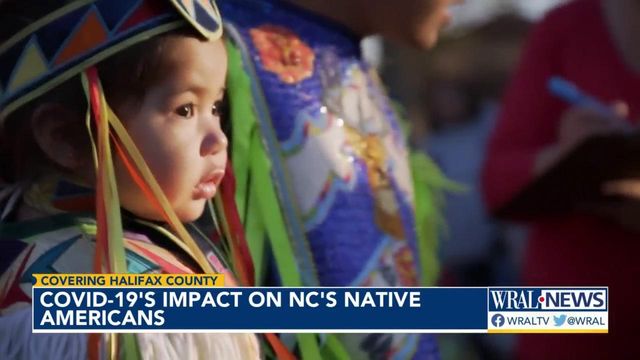'We've been forgotten': NC tribe says Native Americans have been left behind during the pandemic
Leaders of the Haliwa-Saponi tribe say they're caught between a rock and a hard place: having to fight to get the COVID-19 support their tribe needs, while at the same time convincing them it's safe to take.
Posted — UpdatedLeaders of the Haliwa-Saponi tribe say they’re caught between a rock and a hard place: having to fight to get the COVID-19 support their tribe needs, while at the same time convincing them it’s safe to take.
“We’ve just been forgotten unfortunately, also forgotten at COVID time,” Haliwa-Saponi tribal administrator Jamie Oxendine said.
On a stretch of N.C .Highway 561, outside the rural Halifax County town of Hollister, is the tribal center for the Haliwa-Saponi, a state-recognized tribe of more than 4,000 people who’ve spent the past nineteen months in a fight for their lives.
“COVID has been devastating to the Native American community all across the country,” Oxendine said. “And especially in a very rural area like Hollister for the Haliwa-Saponi indian tribe.”
Leaders said the tribe was at a disadvantage as soon as the pandemic began, struggling to be recognized for CARES Act funds and PPE.
And in the spring of 2021, the Haliwa-Saponi had to fight to get vaccines at the same time as federally recognized tribes such as the Eastern Cherokee.
“It was harder to get the vaccine and even just testing to the Native American community than it was the other communities,” Oxendine said.
With Native Americans already four times more likely to be hospitalized after testing positive for COVID-19 and many of their members unable to afford to stay home from work to quarantine, Oxendine said the Haliwa-Saponi have suffered tremendously from the virus.
“The Delta variant devastated the tribe,” Oxendine said. “At one point in time, sadly, our tribal flag was at half-mast because we were losing so many tribal members to COVID.”
The tribe eventually received hundreds of thousands of dollars in CARES Act funds and federal rental assistance, along with the much-needed vaccines.
On Wednesday, the North Carolina Department of Health and Human Services reported that only 28% of Native Americans in the state had received at least one shot, as tribes said they now had to convince their members that a government that had abused them for centuries was offering them a lifeline.
“Some of the conversations are very heated,” Oxendine said. “You will always have native people that will never trust the white man, will never trust the federal government.”
Leaders of the tribe said that acknowledging Indigenous People’s Day could be a step in the right direction, but the pandemic has shown Native Americans are still a long way from reaching true equality.
“We don’t live in the 19th century, we don’t live in the 18th century,” Oxendine said. “We’re a part of the population, and we want to be remembered.”
The tribe is waiting on around $700,000 in funds from the American Rescue Plan to arrive, which leaders said would be spent entirely on their COVID-19 response.
Related Topics
• Credits
Copyright 2024 by Capitol Broadcasting Company. All rights reserved. This material may not be published, broadcast, rewritten or redistributed.






